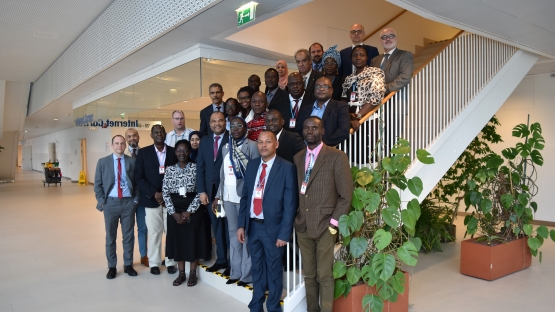Medical physicists work with the very sophisticated technology used in radiation medicine to diagnose and treat patients with diseases such as cancer and cardiovascular diseases. They need knowledge of both the human body and of the principles of physics, and of how to apply these principles for diagnosing or treating patients. While a doctor focuses on the diagnosis and treatment of disease, a medical physicist concentrates on the delivery of treatment, ensuring its effectiveness as well as patient protection.
The African continent faces many challenges concerning the recognition and availability of qualified medical physicists in hospitals, clinics and other health care facilities that use radiation technology, such as diagnostic imaging units. Without a qualified medical physicist, patients may receive non-optimized radiation procedures that result in inadequate diagnosis or treatment, or in extreme cases, may even lead to overexposure.
The IAEA is working with the countries of the African Regional Cooperative Agreement for Research, Development and Training related to Nuclear Science and Technology (AFRA) to address this challenge through various regional projects. The goal is to improve the overall safety and effectiveness of nuclear medicine and diagnostic radiology services in Africa through dose optimisation and appropriate quality assurance programmes conducted by medical physicists.
Regional project coordinators with a background in medical physics from 19 IAEA Member States in Africa (Algeria, Burkina Faso, Cameroon, Cote d’Ivoire, Egypt, Ethiopia, Ghana, Morocco, Niger, Nigeria, Senegal, South Africa, Sudan, Tunisia, Uganda, U.R Tanzania, Zambia and Zimbabwe) met with IAEA staff in Vienna from 14-18 May 2018 to review results achieved under an earlier IAEA project[1], and to discuss a new regional project that focuses on building the capacity of medical physicists in the Africa region[2].
At the meeting, the participants reviewed the status of each country’s medical physics programme in terms of the progress made and lessons learned from the earlier project, and shared information on current developments, trends and perspective in medical physics in the region. The participants also focused on formulating activities for implementation under the new project.
Shaukat Abdulrazak, Director of the Division for Africa, opened the meeting, stressing the importance of asking the critical questions necessary to improve Africa’s ability to combat the rise of cancer cases, and to provide quality diagnostic imaging services to the population more effectively. He reiterated the IAEA’s willingness to continue its support to promote and raise awareness of the medical physicist profession, and to support of long-term training that will create a critical mass of medical physicists in the region. The IAEA is also committed to assisting the development of national and regional education and training programmes in medical physics and the transfer of knowledge in various technical aspects of the profession, including quality control/quality assurance and dose optimisation.
[1] RAF6048, ‘Strengthening Medical Physicists’ Capacities to Ensure Safety in Medical Imaging, with an Emphasis on Paediatric Imaging Safety (AFRA)’.
[2] RAF6053, ‘Enhancing Capacity Building of Medical Physicists to Improve Safety and Effectiveness of Medical Imaging (AFRA)’.






